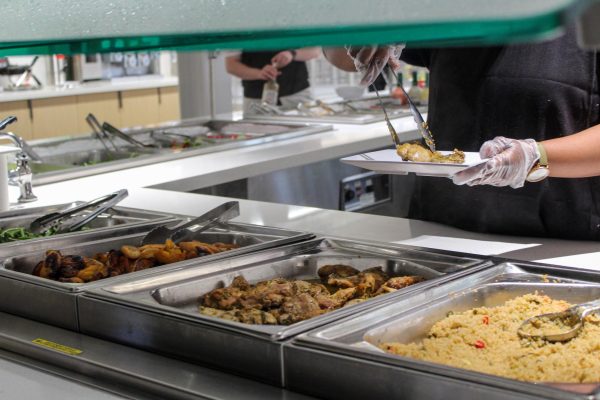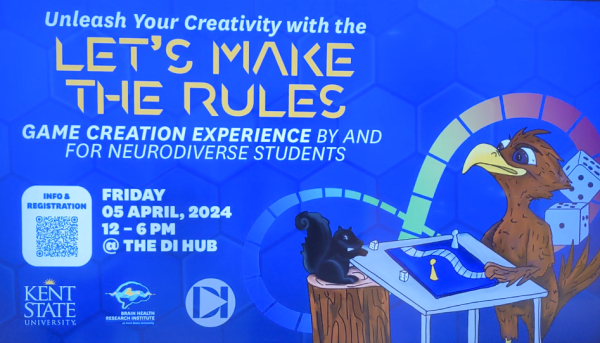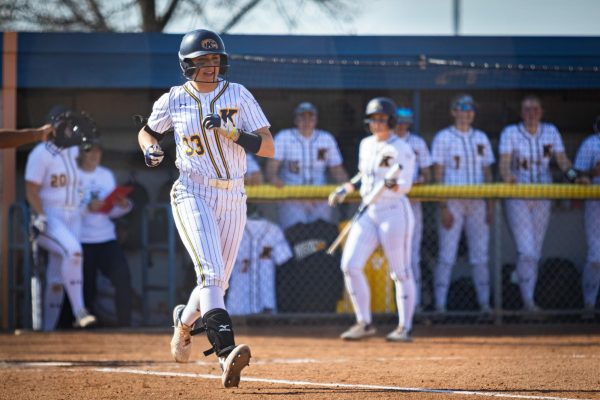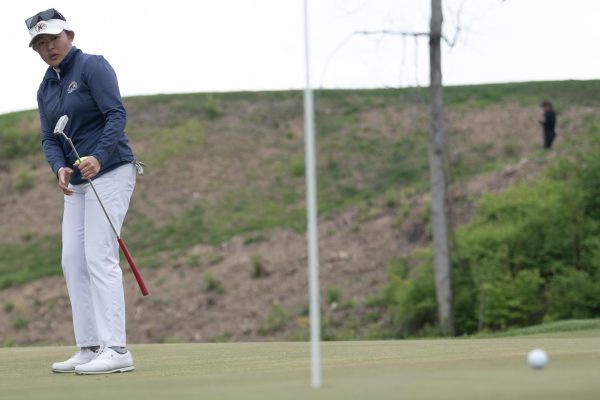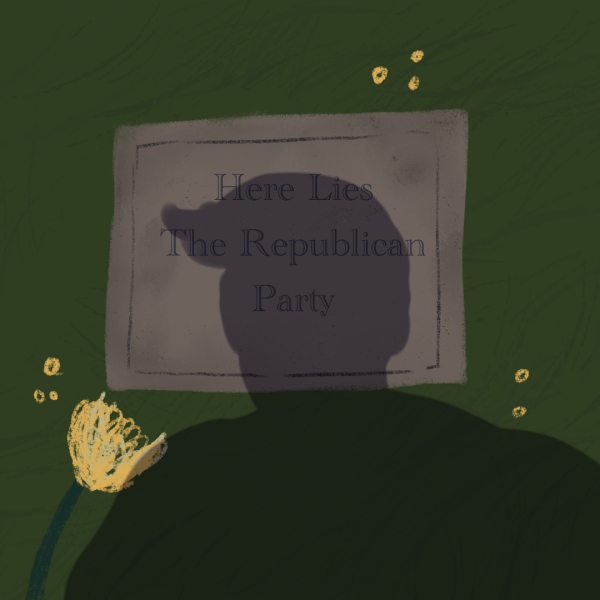‘Preeminent’ job of president is fundraising
May 9, 2006
The following are excerpts from Lester Lefton’s remarks to The College of William and Mary faculty in 2005, outlining his educational philosophy. He made no such appearance at Kent State. William and Mary is a selective public university in Williamsburg, Va., with about 7,650 students.
There were only a few places I felt I would be willing to be college president. I was not willing to go back to the University of South Carolina or a large state institution. (I was) more interested in going to a university with the same kind of passion of liberal education I did. At South Carolina, it was a very large place.
I see the work of a college president as divided into about five parts – the first one and preeminent one is to raise money. Clearly, a school like The College of William and Mary has an extraordinary need for cash … You’ve got a great faculty. You’ve got superior students … you’ve created a rich environment for students to grow, and yet you are wildly undercapitalized. It’s amazing you’ve been able to accomplish what you have with so little cash … You need cash to raise faculty salaries …
Number two is to manage the financial resources of the institution. It’s important when you have an endowment of $400 million or whether you have an endowment of a billion, which is what I plan to get inside of a decade … You guys are going to have to build the infrastructure, you’re going to have to hire more development officers, you’re going to have to hire a first-class vice president of development … When you do that, you have to manage that endowment with prudence, with skill, with a good return on investment. You have to make sure money is being invested wisely.
The third task is to make sure the academic mission of the school is kept intact. You don’t need to reinvent yourself. (You) don’t need to become different … What you really need to do is continue to do what you do well but with the appropriate level of support …
The fourth thing for the role of the president is to maintain a public persona that is vibrant and that is passionate. I have … grown awfully affectionate for what you do and the way you do it … Students love this place … The alumni seem to have affection that is truly extraordinary … Their wallets don’t often follow their hearts …
I need to put that public face on – present a message over and over again … I want to take a bus tour of Virginia. I want to take two or three of the best faculty and students with me … to every Rotary Club, Kiwanis Club, every guidance counselor in all the best high schools in the state and tell the story of William and Mary … to explain to people why sending their son or daughter or grandson or granddaughter will change lives forever …You have to tell that story over and over. President Bush is wonderful at stating a message … There’s a man who knows how to deliver the story, and that’s how any president has to be. You tell it often and tell it true and make it believable, and in doing so I’ll be able to raise money that I think is so necessary.
And last but not least, a word about athletics. Athletics in the United States is very complicated right now. I’m delighted to say the faculty, the students, the athletic directors, the coaches at William and Mary do a great job. You’re graduating students at a high rate; you run an ethical program; you’re graduating minority students, majority students; you’re actually winning games – this is a good thing, too – and you’re keeping cost in proportion to tuition and other expenses in college.
… What I’ve been doing for the past four years is preparing for this job … All academic deans report to me … I supervise athletic compliance and continuing eligibility … (I) supervise admissions, enrollment management, housing; student affairs reports to me. (So does auxiliary services, the recreation center, food services.) I have been functioning as chief operating officer of the university for the past six years and gained invaluable experience that I think will make it easier for me to manage the college.
I feel my experience at Tulane has prepared me to see the big picture … to look at what it takes to keep (an) eye on the ball and deal with initiatives …
To simplify sometimes long-winded questions William and Mary faculty asked Lefton, they are summarized by topic.
ON FUNDRAISING
To raise serious money, you (have) to have support structure in place … people who go out there and collect money from a lot of people, people who will introduce me to people. … In development, 90 percent of the money comes from 20 percent of the donors, but nevertheless it’s very important to develop a culture of philanthropy among your undergraduate and grad students …You do that by communicating with them often. I’d send out e-mails to every graduate of this institution on quarterly basis to introduce myself, tell them about the progress we’re making in our campaign … We need to communicate often, and we need to communicate effectively.
I think when you fundraise, you have to develop a broad base of support. You need lots of donors who can give at very different kinds of levels … members of the board of visitors, members of faculty all introduce me to their friends. If anybody here is friends with Bill Gates, I want to meet you after this meeting because we need to have a chat.
… There are lots of ways to raise money, and as president my goal would be to help deans, to help the provost, to help the faculty see those ways to do it. Because you don’t want to increase student body size; you’re not going to be able to increase tuition to $30,000. You have to develop alternative sources of revenue, and whether it’s through donations, whether it’s through grants or whether it’s through starting of new programs that might have a rich donor, you have to have that inspiration, you have to see that possibility and then you turn over to the deans … and the good members of the faculty can make it happen …
ON BEING A STATE UNIVERSITY
I believe in access. I believe an affordable education should be available to students in every state in this union. I believe that underrepresented minorities should have a bite at the apple and public education is the way to go. Higher education in the private sector is so expensive, public is so expensive … We have a public obligation, a responsibility to make sure they access affordability.
We are providing a unique experience for people of our state. We are providing an opportunity for the state to grow economically … your business school, your law school, your education school … this is reaching out to the community in important ways. They’re providing the future teachers, principals, marine biologists … you are doing something very important in higher education, in professional education, in graduate education and in undergraduate education … That’s the reason for public education.
ON INTERNATIONAL EDUCATION AND STUDY ABROAD
It does take more than a bus tour. It takes a plane flight to Berlin, and it takes a plane flight to Tokyo, and it takes a plane flight to Beijing. I really think it’s very important to engage the students in the College of International Studies. I think it’s important to establish relationships with different universities across all of the seas. It changes students’ lives to study in a different country… and I don’t think you need to go on a backpacking tour…
When a student is studying at the London School of Economics or when they go to Beijing, each of these opportunities creates an opportunity for students to become something very different …
I would work with study abroad people … to establish as many of these kinds of programs as possible … International reputation should be … among those academic goals that is very important … because this is the entry to establishing a national presence as a college of distinction with the very best students in London, Paris, Berlin, Jerusalem …
ON DIVERSITY
I have a personal commitment to diversity … I think the president of a college has the obligation, the responsibility and the right to set the agenda for a college – to say we think diversity is important … (I think you create) … a better intellectual dialogue in classrooms when you bring in different kinds of ideas from people with different ethnicities, people of different socioeconomic status, people from different parts of the country, people with different ideas …
It’s the right thing to do. How you achieve this is important. You target faculty hires, you make sure pools of candidates for jobs is sufficiently broad, that numbers of minority groups and women have an opportunity to apply … You have to have the support structure in place to make sure that they succeed. There needs to be … a Latino faculty members association, an African-American faculty member support group. We need to make sure the deans are providing mentoring of the faculty so they understand what the tenure requirements are, so that they truly understand the culture of William and Mary…
ON FACULTY RELATIONS
I’m delighted to tell you that in 33 years I’ve been in this business, I have never had major confrontation. I have had disagreements … but the way I handle those disagreements is I ask to meet with them … to help me to understand … I really believe in working for consensus. I believe in shared government … I meet with every department on our campus every year … I make my way across campus, and we sit down for an hour or so and talk … I learn what faculty concerns are. They learn what my aspirations are, and it’s informative both ways. (I have) had my mind changed a few times. I have been willing to say, “You know you’re right; let me rethink this.”
ON DOCTORAL PROGRAMS AND FUNDING
We have many Ph.D. programs (at Tulane). We have a very talented faculty. I wish we had the money to sink into these Ph.D. programs the money that they deserve … My president has been working hard to provide those resources … If I could go back to 1834 … I would limit the number of Ph.D. programs to very few, very successful programs … Unfortunately once these programs begin, it’s very hard to take them away. And that’s not a battle I want to fight right now. Other things at Tulane University are more important. It might be in the future, and it might not be.
I love our faculty. We’ve got pockets of excellence here, there and everywhere … We just need to come up with enough money … That’s why again I think we’ve been very strategic in managing the size, scale and structure of the college to keep it manageable.
ON LEADERSHIP
It’s not a matter of changing. It’s a matter of enhancing, of building upon strength … What we want to do is say, “What have we got?” and strategically over the next 10 years … what can an academic, financial leader do to make this place excel even more?
What decisions have to be made? Limiting growth in certain areas, making sure the facilities are top-notch … it’s about enhancing … Now that doesn’t mean we can’t push things from time to time – sometimes some departments need to grow, some departments need to shrink.
Quite frankly, I don’t ever do that – I think that’s up to … the dean to make those kinds of decisions. I can provide overall guidance … what I see from my 33 years of doing this that says, “This is what’s going to get you this kind of national attention. This is what’s going to provide access. This is what will help you sell your institution and recruit faculty.”
What are the things I can do to help enhance the college? I would love to be involved in helping you recruit faculty members. I would like to get on a plane with the dean and go to the campus … to a distinguished scholar in a certain area and help convince them to come to The College of William and Mary because this is such an extraordinary place …
I would not only get involved in recruiting the faculty when asked to by the dean, but I would do it with students … I think we need to recruit high-end students, students of distinction, valedictorians, high SATs and high grade points … I will call them personally… I’ll get a call list of top 100 kids in the state and call them and say, “Hi, this is Lester Lefton, and I’m the president of The College of William and Mary, and I heard you were interested in coming here.” And after they dropped the phone and picked it back up again, I’d invite them to campus to meet me, to meet with the admissions director and work individually … to get them to come here.
We need the most distinguished group of students we can get, we need the most distinguished group of faculty, and we need to retain them … you can’t let your best faculty leave. I would work with the provost and the dean and make resources available, whether those resources are … salaries, whether those resources are graduates or undergraduate student assistants … we can’t let the best people – the key, the heart of the institution – leave … and I worry about that right now. I think you’re at a watershed moment. You’re so underfunded, and the salaries are sufficiently bad, and something has to be done.
The support staff, the administrative staff, the professional staff – and we all know as faculty members, they’re the ones who are getting the work done while we teach our classes … And so we’re working on the faculty salaries, we’re working on staff salaries, we’re working on professional salaries, the techs, the people who work in the laboratories … the people who are cleaning the dormitories … making sure that works smoothly and efficiently is going to be very important. I don’t wanna be the president when the students … are all complaining, “Nothing works here!”
It’s gotta work smoothly, you’ve gotta have the right people … and so I think that making sure your people are protected, and that you get the very best people at every level of the institution is a very, very high priority. That is going to be among my top priorities, because there’s a lot involved in running a university.
ON GRADUATE STIPENDS AND RELATIVELY LOW ONES AT TULANE
Tulane suffered from very different financial times (in the) 1990s. While others were prospering, taking advantage of the stock market and other opportunities, Tulane made a series of bad decisions … We went through two major reorganizations – faculty were let go, graduate programs were terminated, stipends were taken away from many of our better grad programs, we had nationally ranked graduate programs that were cut …
… Since then we have been increasing funds available for graduate stipends, and have not gotten up to the point where they are competitive in most disciplines. We’re still not where we want to be … Some state schools, Ohio State is a good example, Berkeley is another good example, of funding schools between $22,000 and $25,000 levels … We were funding at $12,000, got up to $14,000 and $15,000 … We’re getting into the zone, but we’re still losing our first-year graduate students to places giving better endowments. I hate to keep coming back to this, but the endowments that go to support graduate education are one of the principal goals we have now, and we are indeed going to increase our graduate stipends …
These excepts were compiled by reporter Abbey Stirgwolt. The full audio of the remarks at William and Mary is at http://www.wm.edu/presidentialsearch/audio/lefton.wma.














